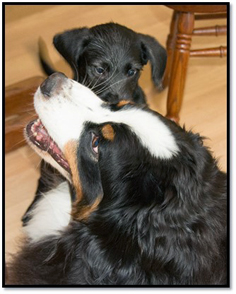Socializing Your Young Pup: Healthy or Hazardous?
by Nancy Kay, DVM
 If you want to make yourself a little crazy, ask a bunch of dog experts if it’s a good idea to socialize your youngster before completion of his or her puppy vaccinations. Guaranteed you will hear, “Absolutely!” from some and, “Absolutely not!” from others. Why the discord? While we all know that socialization with people and other dogs is developmentally beneficial for youngsters, we also recognize that most pups are not fully protected against that dastardly disease duo (distemper and parvovirus) until they’ve had the last of their puppy vaccinations at four months of age.
If you want to make yourself a little crazy, ask a bunch of dog experts if it’s a good idea to socialize your youngster before completion of his or her puppy vaccinations. Guaranteed you will hear, “Absolutely!” from some and, “Absolutely not!” from others. Why the discord? While we all know that socialization with people and other dogs is developmentally beneficial for youngsters, we also recognize that most pups are not fully protected against that dastardly disease duo (distemper and parvovirus) until they’ve had the last of their puppy vaccinations at four months of age.
The Pros and Cons
Canine distemper is a highly contagious and heartbreaking disease. It spreads from dog to dog via respiratory secretions. Most puppies who contract distemper don’t survive, no matter how aggressively they are treated. Parvovirus organisms are passed in the feces of infected dogs, and they remain contagious in the environment for weeks to months after they are shed. Puppies who are sick with parvovirus disease do survive, but not without aggressive medical care that, in and of itself, can negatively impact socialization (some pups become timid and fearful in response to all of the necessary poking and prodding). Taking puppies out into the world before they have ample immunity to canine distemper and parvovirus is risky business.
On the other hand, puppies who are not well socialized from a very young age are less likely to develop into adult canine good citizens. They are more likely to develop undesirable traits such as inappropriate aggression, fear, and anxiety. Such behaviors often lead to dismal outcomes such as backyard isolation, rehoming, and euthanasia.
Sensible Socialization
Clearly, there are perils on both sides of the fence when it comes to early socialization. What’s a puppy raiser to do? My recommendation for pups younger than four months of age is what I refer to as “sensible socialization” involving one-on-one play dates in safe environments. Here’s what’s involved:
Please know that these “sensible socialization” recommendations represent one veterinarian’s opinion. Other veterinarians, breeders, or trainers might provide differing advice based on their experiences. It is ultimately up to you to determine how best to socialize your pup while minimizing health risks.
How have you socialized your puppies? If you are a trainer, behaviorist, veterinarian, or breeder, please do chime in.
CREDIT:
Dr. Nancy Kay, DVM Diplomate, American College of Veterinary Internal Medicine.
Recipient, American Animal Hospital Association 2009 Animal Welfare and Humane Ethics Award Recipient, 2009 Dog Writers Association of America Award for Best Blog Recipient, 2009 Eukanuba Canine Health Award
 Author of Speaking for Spot: Be the Advocate Your Dog Needs to Live a Happy, Healthy, Longer Life
Author of Speaking for Spot: Be the Advocate Your Dog Needs to Live a Happy, Healthy, Longer Life
Website: http://speakingforspot.com
Spot’s Blog: "http://www.speakingforspot.com/blog
Email: dr.kay@speakingforspot.com
Become a Facebook Fan: Facebook Fan - Nancy-Kay
 If you want to make yourself a little crazy, ask a bunch of dog experts if it’s a good idea to socialize your youngster before completion of his or her puppy vaccinations. Guaranteed you will hear, “Absolutely!” from some and, “Absolutely not!” from others. Why the discord? While we all know that socialization with people and other dogs is developmentally beneficial for youngsters, we also recognize that most pups are not fully protected against that dastardly disease duo (distemper and parvovirus) until they’ve had the last of their puppy vaccinations at four months of age.
If you want to make yourself a little crazy, ask a bunch of dog experts if it’s a good idea to socialize your youngster before completion of his or her puppy vaccinations. Guaranteed you will hear, “Absolutely!” from some and, “Absolutely not!” from others. Why the discord? While we all know that socialization with people and other dogs is developmentally beneficial for youngsters, we also recognize that most pups are not fully protected against that dastardly disease duo (distemper and parvovirus) until they’ve had the last of their puppy vaccinations at four months of age.The Pros and Cons
Canine distemper is a highly contagious and heartbreaking disease. It spreads from dog to dog via respiratory secretions. Most puppies who contract distemper don’t survive, no matter how aggressively they are treated. Parvovirus organisms are passed in the feces of infected dogs, and they remain contagious in the environment for weeks to months after they are shed. Puppies who are sick with parvovirus disease do survive, but not without aggressive medical care that, in and of itself, can negatively impact socialization (some pups become timid and fearful in response to all of the necessary poking and prodding). Taking puppies out into the world before they have ample immunity to canine distemper and parvovirus is risky business.
On the other hand, puppies who are not well socialized from a very young age are less likely to develop into adult canine good citizens. They are more likely to develop undesirable traits such as inappropriate aggression, fear, and anxiety. Such behaviors often lead to dismal outcomes such as backyard isolation, rehoming, and euthanasia.
Sensible Socialization
Clearly, there are perils on both sides of the fence when it comes to early socialization. What’s a puppy raiser to do? My recommendation for pups younger than four months of age is what I refer to as “sensible socialization” involving one-on-one play dates in safe environments. Here’s what’s involved:
Avoid the temptation to bring your new puppy home once weaned from its mother. Ideally, littermates should remain together until at least 10 weeks of age. All that rough and tumbling between siblings builds a solid foundation for good socialization skills. Allow your pup to socialize only with dogs who appear overtly healthy and are known to be up to date on their vaccines or have serology results that indicate adequate disease protection against distemper and parvovirus. Your puppy’s playmates should be proven “good sports” who don’t lose their temper when reprimanding clumsy, demanding puppies. One-on-one play dates are best. Interaction with more than one dog at a time can be overwhelming for puppies. Puppy kindergarten classes for dogs under four months of age are risky business. Even when vaccinated “by the book” most pups experience lapses in their immune protection against distemper and parvovirus while in the midst of completing their puppy vaccinations. This has to do with individual variation in the timing of when maternal immunity (protection acquired from the mama dog) tapers off. And, one cannot tell a book by its cover- a pup with parvovirus will be contagious to other dogs several days before showing any outward symptoms of this disease. Socialization should ideally take place in individual home environments rather than places that may be frequented by dogs with unknown vaccination histories. This means avoiding venues such as public recreation areas, pet stores, and dog parks. Socializing with other dogs is great, but don’t forget to socialize your pup with the people you know- ideally individuals of all ages, shapes, sizes, and colors.
Please know that these “sensible socialization” recommendations represent one veterinarian’s opinion. Other veterinarians, breeders, or trainers might provide differing advice based on their experiences. It is ultimately up to you to determine how best to socialize your pup while minimizing health risks.
How have you socialized your puppies? If you are a trainer, behaviorist, veterinarian, or breeder, please do chime in.
CREDIT:
Dr. Nancy Kay, DVM Diplomate, American College of Veterinary Internal Medicine.
Recipient, American Animal Hospital Association 2009 Animal Welfare and Humane Ethics Award Recipient, 2009 Dog Writers Association of America Award for Best Blog Recipient, 2009 Eukanuba Canine Health Award
 Author of Speaking for Spot: Be the Advocate Your Dog Needs to Live a Happy, Healthy, Longer Life
Author of Speaking for Spot: Be the Advocate Your Dog Needs to Live a Happy, Healthy, Longer LifeWebsite: http://speakingforspot.com
Spot’s Blog: "http://www.speakingforspot.com/blog
Email: dr.kay@speakingforspot.com
Become a Facebook Fan: Facebook Fan - Nancy-Kay
